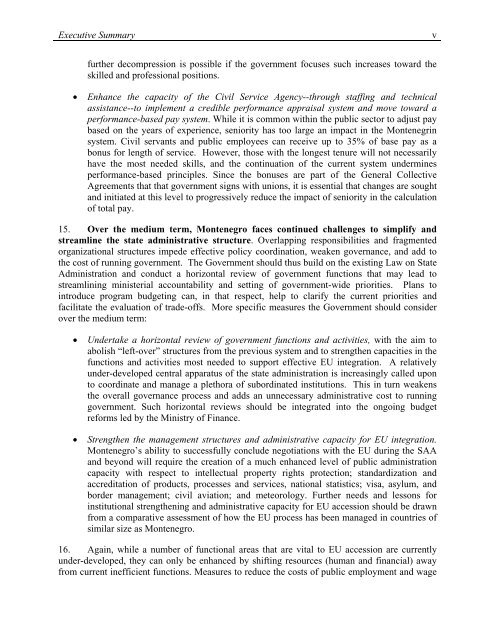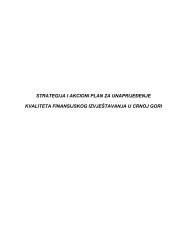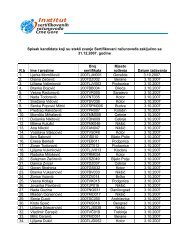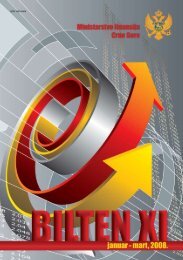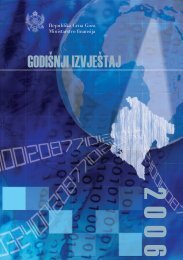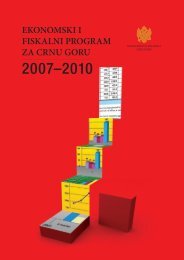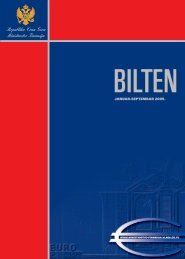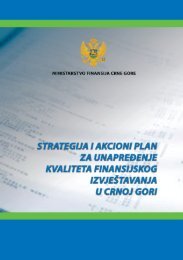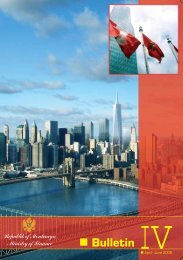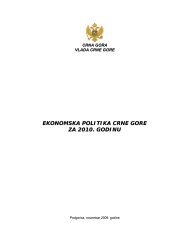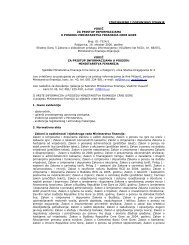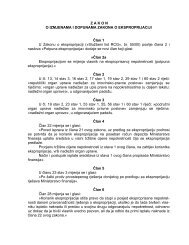Republic of Montenegro: Public Expenditure and ... - Vlada Crne Gore
Republic of Montenegro: Public Expenditure and ... - Vlada Crne Gore
Republic of Montenegro: Public Expenditure and ... - Vlada Crne Gore
Create successful ePaper yourself
Turn your PDF publications into a flip-book with our unique Google optimized e-Paper software.
Executive Summary<br />
v<br />
further decompression is possible if the government focuses such increases toward the<br />
skilled <strong>and</strong> pr<strong>of</strong>essional positions.<br />
• Enhance the capacity <strong>of</strong> the Civil Service Agency--through staffing <strong>and</strong> technical<br />
assistance--to implement a credible performance appraisal system <strong>and</strong> move toward a<br />
performance-based pay system. While it is common within the public sector to adjust pay<br />
based on the years <strong>of</strong> experience, seniority has too large an impact in the Montenegrin<br />
system. Civil servants <strong>and</strong> public employees can receive up to 35% <strong>of</strong> base pay as a<br />
bonus for length <strong>of</strong> service. However, those with the longest tenure will not necessarily<br />
have the most needed skills, <strong>and</strong> the continuation <strong>of</strong> the current system undermines<br />
performance-based principles. Since the bonuses are part <strong>of</strong> the General Collective<br />
Agreements that that government signs with unions, it is essential that changes are sought<br />
<strong>and</strong> initiated at this level to progressively reduce the impact <strong>of</strong> seniority in the calculation<br />
<strong>of</strong> total pay.<br />
15. Over the medium term, <strong>Montenegro</strong> faces continued challenges to simplify <strong>and</strong><br />
streamline the state administrative structure. Overlapping responsibilities <strong>and</strong> fragmented<br />
organizational structures impede effective policy coordination, weaken governance, <strong>and</strong> add to<br />
the cost <strong>of</strong> running government. The Government should thus build on the existing Law on State<br />
Administration <strong>and</strong> conduct a horizontal review <strong>of</strong> government functions that may lead to<br />
streamlining ministerial accountability <strong>and</strong> setting <strong>of</strong> government-wide priorities. Plans to<br />
introduce program budgeting can, in that respect, help to clarify the current priorities <strong>and</strong><br />
facilitate the evaluation <strong>of</strong> trade-<strong>of</strong>fs. More specific measures the Government should consider<br />
over the medium term:<br />
• Undertake a horizontal review <strong>of</strong> government functions <strong>and</strong> activities, with the aim to<br />
abolish “left-over” structures from the previous system <strong>and</strong> to strengthen capacities in the<br />
functions <strong>and</strong> activities most needed to support effective EU integration. A relatively<br />
under-developed central apparatus <strong>of</strong> the state administration is increasingly called upon<br />
to coordinate <strong>and</strong> manage a plethora <strong>of</strong> subordinated institutions. This in turn weakens<br />
the overall governance process <strong>and</strong> adds an unnecessary administrative cost to running<br />
government. Such horizontal reviews should be integrated into the ongoing budget<br />
reforms led by the Ministry <strong>of</strong> Finance.<br />
• Strengthen the management structures <strong>and</strong> administrative capacity for EU integration.<br />
<strong>Montenegro</strong>’s ability to successfully conclude negotiations with the EU during the SAA<br />
<strong>and</strong> beyond will require the creation <strong>of</strong> a much enhanced level <strong>of</strong> public administration<br />
capacity with respect to intellectual property rights protection; st<strong>and</strong>ardization <strong>and</strong><br />
accreditation <strong>of</strong> products, processes <strong>and</strong> services, national statistics; visa, asylum, <strong>and</strong><br />
border management; civil aviation; <strong>and</strong> meteorology. Further needs <strong>and</strong> lessons for<br />
institutional strengthening <strong>and</strong> administrative capacity for EU accession should be drawn<br />
from a comparative assessment <strong>of</strong> how the EU process has been managed in countries <strong>of</strong><br />
similar size as <strong>Montenegro</strong>.<br />
16. Again, while a number <strong>of</strong> functional areas that are vital to EU accession are currently<br />
under-developed, they can only be enhanced by shifting resources (human <strong>and</strong> financial) away<br />
from current inefficient functions. Measures to reduce the costs <strong>of</strong> public employment <strong>and</strong> wage


